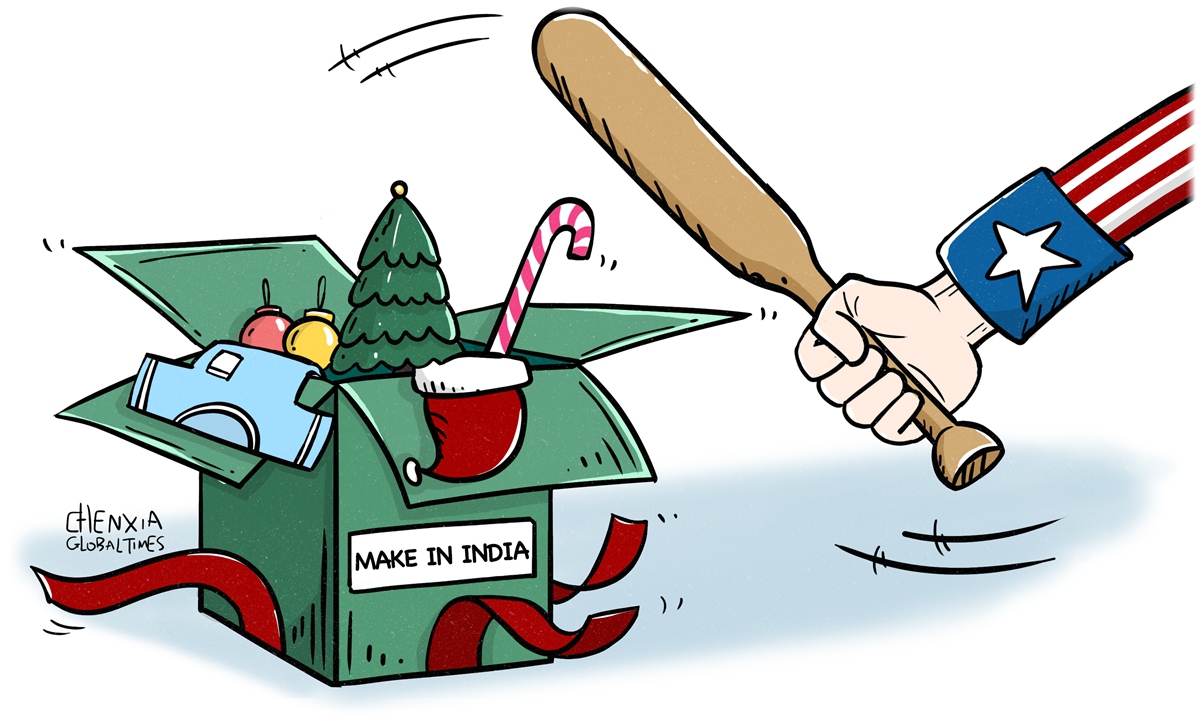
Illustration: Chen Xia/GT
While the US "decoupling" push appears to be aimed directly at China, it is ultimately a form of trade protectionism intended to protect US domestic industries. In this light, even India, viewed as a potential alternative supplier for the US, is experiencing the strain.
Indian solar panels are facing US scrutiny for possible links to so-called "forced labor" in China, Reuters reported on Tuesday.
US Customs and Border Protection (CBP) has detained approximately $43 million in shipments of electronics equipment from India since October 2023 under the US "Uyghur Forced Labor Prevention Act (UFLPA)," according to agency data.
While it is unclear what specific types of electronics equipment the CBP has detained, the situation reflects the protectionist conundrums facing India as it develops its manufacturing sector.
The "forced labor" claims about Northwest China's Xinjiang Uygur Autonomous Region are utter lies concocted by some politicians in the US. The move is actually aimed at impeding China's manufacturing development by excluding the region from the global supply chain.
Superficially, the detainment of India's electronics products may seem to be mainly targeting Chinese manufacturing, but in essence, it is aimed at protecting US interests by ensuring the competitiveness of American companies and the economy.
It is apparent that the current development of the Indian manufacturing sector is, to a large extent, dependent on the Chinese supply chain, as India needs Chinese raw materials, components, technologies and services.
The fact that China edged past the US and emerged as India's largest trading partner with $118.4 billion of two-way commerce in the Indian fiscal year 2023-2024 - from April 2023 to March 2024 - is sufficient to prove that Indian manufacturing cannot exclude products, technologies and services imported from China.
India's exports of electronics goods to the US have surged quickly. For instance, US trade data showed that imports of solar products from India have soared in recent years, hitting $2.3 billion last year, according to Reuters. In the second quarter of 2024, India accounted for 11 percent of US solar panel imports, more than double its share in the previous quarter, according to S&P Global Market Intelligence.
Against this backdrop, it is not surprising that Indian producers have faced setbacks, given the increasing protectionist trend in the US solar industry. This is because any foreign industry that poses a threat to US interests or competes with US industries is likely to be targeted by Washington's trade protectionism, regardless of its origin, be it China, India, the EU or any other economy.
The trend is now clear - the US is increasingly inclined to adopt trade and industrial protectionist measures in order to boost its manufacturing revival, especially in the new-energy and other strategic sectors.
There is no denying that some of India's exports to the US, such as solar panels and textiles, are seen as alternatives to Chinese products for the US, but they are likely only temporary solutions.
In the long run, if Indian industries grow to compete with their US counterparts, which is inevitable, the US is bound to resort to tougher protectionist policies using various excuses.
Amid rising global trade protectionism, India faces much greater resistance in improving its position in the global industrial chain than China did in the past, when it comes to developing the manufacturing sector.
If anything, the US-led "decoupling" push aimed at squeezing Chinese manufacturing out of the global supply chain is unlikely to give India much time or opportunity for large-scale manufacturing growth.
In this context, India needs to diversify its export markets and seek more opportunities in the Asian industrial chain by strengthening cooperation with regional countries to jointly address the challenges of trade protectionism. India needs to enhance trade cooperation with other developing countries in order to collectively uphold the smooth functioning of international trade.




